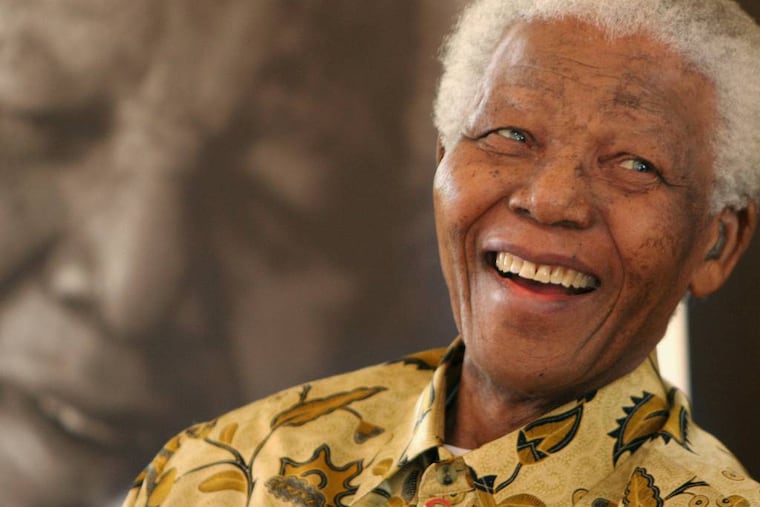In Phila. area, Mandela recalled as source of inspiration
Political leaders across the Philadelphia region Thursday praised Nelson Mandela as an iconic figure whose struggle for justice inspired the world.

Political leaders across the Philadelphia region Thursday praised Nelson Mandela as an iconic figure whose struggle for justice inspired the world.
"I had the honor of meeting President Mandela in Philadelphia in the 1990s, and he is one of the most remarkable and influential people I have ever met," Mayor Nutter said.
"I traveled to South Africa in 2005 and visited Robben Island, where President Mandela was imprisoned. . . . I saw his cell. I watched his long walk to freedom on live television when he was released from prison by the apartheid regime. His idea for the Truth and Reconciliation Commission was possibly one of the best ideas of any human. It was the epitome of his philosophy."
On Friday, all city flags will be lowered to half-staff to show respect for Mandela's passing, Nutter said.
Gov. Corbett called Mandela's death "the passing of a colossus of freedom."
Corbett said Mandela's "personal courage in the fight for human equality and human rights was matched by his generosity of spirit in seeking unity and reconciliation after freeing his nation from the grip of apartheid. The world is a better place for his having walked among us."
State Sen. Anthony H. Williams (D., Phila.) said Mandela "was more than a legendary hero in a distant land. He embodied a universal affirmation that we all worked toward, that all people - regardless of color, income, ethnicity, orientation, history, or faith - deserve to participate and be respected in society."
Rep. Chaka Fattah (D., Pa.) called Mandela "a personal inspiration to me, and to so many others, for the many sacrifices he made on behalf of the country he loved so dearly."
Fattah added, referencing a quotation by the Rev. Dr. Martin Luther King Jr. about the moral universe: "While we deeply regret this loss, we are grateful for his work bending the arc of history toward justice, and for his legacy that will continue to lead us all in the pursuit of a more just and more peaceful world."
On July 4, 1993, in Philadelphia, Mandela was awarded the Liberty Medal jointly with F.W. de Klerk, the last president of apartheid-era South Africa.
The decision to honor both Mandela and de Klerk was controversial in the region's African American community. Then-U.S. Rep. Lucien E. Blackwell called on the medal-selection commission to rescind the award to de Klerk. Some leaders boycotted the Independence Hall ceremony.
Mandela acknowledged the controversy in his acceptance speech.
"It will have seemed strange to some that two South Africans, with respective histories as different as those of this year's honorees, should share the honor of receiving the eminent Liberty Medal," Mandela said.
"Equally, it will have seemed strange to some that we, as fighters for liberation, are - together with those who have been captains of the apartheid - involved in processes leading to the democratic transformation of South Africa," he said.
Mandela then recalled that the U.S. Constitution was crafted amid slavery.
"Strange though all these things might be, and evocative of different responses, they nevertheless speak to one issue: They speak to the durability of the glorious vision that gave birth to the independence of this country and to the United States Constitution," he said.
The following year, Mandela succeeded de Klerk as president of South Africa.
Todd Bernstein, director of the Greater Philadelphia Martin Luther King Day of Service/MLK 365 and a longtime antiapartheid activist, made several trips to South Africa and served as an international election monitor in Johannesburg when Mandela was elected in April 1994 and reelected in 2004. He hailed Mandela, whom he met at the Liberty Medal ceremony, as a model world leader.
"Mandela, when he was elected president, set the example not only for the continent of Africa, but really for what a leader could be for all humankind. He was a world leader, not just the leader of an important country," Bernstein said.
Tukufu Zuberi, chairman of the sociology department and a professor of Africana studies at the University of Pennsylvania, said Mandela was a leader but also a great symbol of humanity.
"When the people of South Africa needed a life of sacrifice, he stood and walked the walk. After the people of South Africa ended apartheid, he guided them on a path that set the standard for political reconciliation," Zuberi said. "He was an international symbol of that which is good in us all if we could have the courage of a Nelson Mandela."
Former Mayor John F. Street met with Mandela while Street was City Council president, and the encounter left an indelible impression.
"Never had I met a more clear-thinking, compassionate, and principled individual," Street said Thursday night. "The strength of his character and power of his personality was evident in every word, gesture, and smile."
Sen. Robert Menendez (D., N.J.) remembered a meeting he had with Mandela in South Africa that "left me humbled by his humility and inspired by his fortitude - it was a moment that I never will forget."
Menendez said Mandela "united a nation, while demonstrating almost supernatural gifts of inner strength, forgiveness, and reconciliation. Few individuals in human history can truly claim a legacy of peace and perseverance like Mandela can."